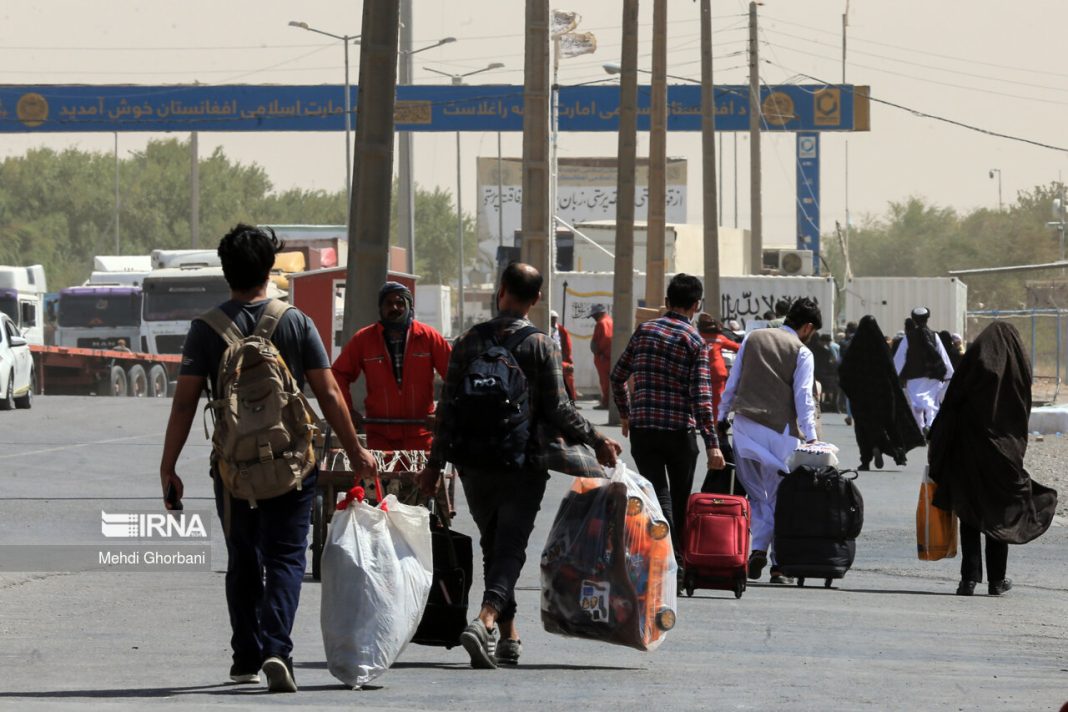
Border Clashes and Refugee Crisis: Pakistan-Afghanistan Relations on Edge
درگیریهای مرزی و بحران پناهندگان: روابط پاکستان و افغانستان در حالت بحران
پاکستان تصمیم به اجرای یک اقدام گسترده گرفته است که میتواند منجر به بازگشت اجباری تقریباً 850,000 پناهنده ثبتشده افغان به وطنشان در ماه آینده شود، اگر آنها به فراخوان خروج داوطلبانه توجه نکنند. این اقدام قریبالوقوع، که به طور گسترده توسط رسانههای مختلف پاکستانی گزارش شده است، آخرین فصل در ماجرای اخراجهای اجباری هدفگذاری شده علیه مهاجران افغان را نشان میدهد. اخراجهای پیش رو قرار است از 15 آپریل آغاز شوند و به طور خاص افراد دارنده کارت شهروندی افغان (ACC)، سند هویت صادرشده توسط دولت پاکستان، را تحت تأثیر قرار دهند. ابتدا، دارندگان ACC تشویق به خروج داوطلبانه خواهند شد؛ با این حال، پیامدهای عدم پایبندی جدی است، زیرا آنها با دستگیری و سپس اخراج مواجه خواهند شد.
این اقدام پیش رو نشان دهنده مرحله دوم ابتکار عمل پاکستان با هدف بازگرداندن بیش از 3 میلیون پناهجوی افغان است. وخامت اوضاع از توجه کارشناسان حقوقی و مدافعان حقوق بشر دور نمانده است. بسیاری بر شرایط مخاطره آمیز مواجهه با افرادی که در معرض اخراج اجباری قرار گرفته اند، تأکید می کنند و تأکید می کنند که بیش از 850000 افغان دارای ACC در تیررس قرار دارند، بدون اینکه بین آنها و افرادی که ویزاهای معتبر دارند، تفاوتی قائل نشده باشد.
پژواک اخراج های گذشته به طرز شومی طنین انداز می شود و با گزارشات نقض گسترده و نقض حقوق بشر مشخص می شود. ادعاهای اخاذی توسط مقامات مجری قانون و اخراج غیرقانونی افرادی که دارای اسناد معتبر هستند، سایه تاریکی بر تلاشهای قبلی اخراج انداخته است. در مقابل این پس زمینه، مدافعان حقوق بشر خواستار مداخله فوری برای حفاظت از حقوق اساسی و رفاه پناهندگان شده اند.
جامعه بینالملل با سازمانهایی مانند عفو بینالملل که منطق پشت هدف قرار دادن پناهجویان افغان را زیر سؤال میبرد، به نحوه رسیدگی پاکستان به بحران پناهجویان افغان توجه کرده است. خصومت های اخیر، از جمله گلوله باران یک تاسیسات نظامی پاکستان توسط طالبان، وضعیت از قبل ضعیف را پیچیده تر می کند و به طور بالقوه بر رویکرد پاکستان در قبال مهاجران افغان تأثیر می گذارد.
مواضع در حال تحول پاکستان در قبال پناهجویان افغان مسیری را از مهمان نوازی اولیه تا وضعیتی که با اقدامات سختگیرانه مشخص می شود ترسیم می کند. موضع پاکستان که زمانی به عنوان پناهگاه موقت برای فراریان از ظلم طالبان در افغانستان به شمار می رفت، به عزم سختگیرانه ای برای بازگرداندن افغان ها به کشور تغییر کرده است که منجر به اخراج صدها هزار افغان از سال 2023 شده است. دلیل اصلی این اقدام پاکستان است. ادعای دست داشتن پناهجویان افغان در حملات تروریستی در داخل پاکستان است. با این حال، هیچ مدرکی برای این ادعاها وجود ندارد، و به نظر میرسد که عمدتاً لفاظیهای تشکیلات پاکستانی برای پنهان کردن ناکارآمدی خود در کنترل نهادهای تروریستی باشد.
پیامدهای این اقدامات خودسرانه پاکستان، افغانستان را در وضعیت حساسی قرار داده است و آنها را با فشار اسکان دادن به پناهجویان عودت میکنند. هجوم عودتکنندگان فشار بیسابقهای را بر زیرساختهای شکننده و منابع ضعیف افغانستان وارد میکند و چالشهای اقتصادی-اجتماعی را تشدید میکند و به یک بحران انسانی با ابعاد خیرهکننده دامن میزند.
در میان این چالش ها، مناقشه طولانی مدت بر سر خط دیورند لایه دیگری از پیچیدگی را به پویایی منطقه می افزاید. خط دیورند که در زمان استعمار بریتانیا ترسیم شد، به عنوان مرز عملی بین پاکستان و افغانستان عمل می کند. با این حال، افغانستان هرگز آن را به عنوان یک مرز بین المللی به رسمیت نشناخته است که منجر به تنش های مداوم بین دو کشور شده است.
حصارکشی خط دیورند توسط پاکستان تنها این تنش ها را تشدید کرده است. این مانع که برای مهار تحرکات فرامرزی و جلوگیری از نفوذ شبه نظامیان در نظر گرفته شده بود، با مخالفت شدید افغانستان روبرو شده است. دولت افغانستان حصارکشی را اقدامی یکجانبه میداند که حاکمیت افغانستان را نادیده میگیرد و وضعیت اسفناک پناهندگان افغان را که به دنبال پناهگاهی در پاکستان هستند، تشدید میکند.
درگیری های اخیر در امتداد مرز پاکستان و افغانستان بر بی ثباتی اوضاع تاکید می کند. حملات و درگیری های تلافی جویانه بین نیروهای پاکستانی و افغان به عنوان یادآوری تلخ تنش های در حال جوشش ناشی از اختلافات ارضی و منافع ژئوپلیتیکی رقابتی است.
با بالا گرفتن تنش ها در امتداد مرز پاکستان و افغانستان، سرنوشت پناهجویان افغان در وضعیت نامطمئنی قرار دارد. با نزدیک شدن به مرحله دوم اخراج ها، جامعه بین المللی خود را بر سر دوراهی می بیند و مجبور است با بحران انسانی که توسط پاکستان تشدید شده است مقابله کند.
Pakistan has decided to implement a sweeping measure that could see the involuntary return of approximately 850,000 documented Afghan refugees to their homeland next month if they do not heed the call for voluntary departure. This imminent action, extensively reported by various Pakistani media outlets, marks the latest chapter in a saga of forced deportations targeting Afghan migrants. Scheduled to commence on April 15, the impending expulsions are set to particularly impact individuals holding Afghan Citizen Cards (ACC), an identification document issued by the Pakistani government. Initially, ACC holders will be encouraged to leave voluntarily; however, the consequences of non-compliance are grave, as they will face arrest followed by deportation.
This forthcoming move represents the second phase of Pakistan’s overarching initiative aimed at repatriating over 3 million Afghan refugees. The gravity of the situation has not escaped the attention of legal experts and human rights advocates. Many underscores the precarious circumstances confronting those subjected to forced deportation, emphasizing that over 850,000 ACC-holding Afghans are in the crosshairs, with no distinction made between them andthe individuals possessing valid visas.
The echoes of past expulsions reverberate ominously, punctuated by accounts of widespread abuses and human rights violations. Allegations of extortion by law enforcement officials and wrongful deportations of individuals holding valid documentation cast a dark shadow over previous deportation efforts. Against this backdrop, human rights advocates have called for urgent intervention to safeguard the fundamental rights and well-being of refugees.
The international community has cast a watchful eye on Pakistan’s handling of the Afghan refugee crisis, with organizations such as Amnesty International questioning the rationale behind targeting Afghan refugees. Recent hostilities, including the shelling of a Pakistani military installation by the Taliban, further complicate an already tenuous situation, potentially influencing Pakistan’s approach to Afghan migrants.
Pakistan’s evolving stance towards Afghan refugees charts a trajectory from initial hospitality to a posture characterized by stringent enforcement measures. Once regarded as a temporary sanctuary for those fleeing the tyranny of Taliban rule in Afghanistan, Pakistan’s stance has changed into a hardened resolve to repatriate Afghans, resulting in the expulsion of hundreds of thousands of Afghans since 2023. The main reason for this action by Pakistan is the alleged involvement of Afghan refugees in the terror attacks inside Pakistan. However there has not been any evidence for these allegations, and appears to be mainly rhetoric by the Pakistani establishment to hide their inefficiency in controlling terror entities.
The repercussions of these arbitrary actions by Pakistan has put Afghanistan in a delicate situation, making them to grapple with the strain of accommodating returning refugees. The influx of returnees places unprecedented pressure on Afghanistan’s already fragile infrastructure and strained resources, exacerbating socio-economic challenges and fueling a humanitarian crisis of staggering proportions.
Amidst these challenges, the longstanding dispute over the Durand Line adds another layer of complexity to the regional dynamics. The Durand Line, drawn during British colonial rule, serves as the de facto border between Pakistan and Afghanistan. However, Afghanistan has never recognized it as an international border, leading to ongoing tensions between the two nations.
The fencing of the Durand Line by Pakistan has only exacerbated these tensions. The barrier, intended to curb cross-border movements and prevent infiltration by militants, has been met with vehement opposition from Afghanistan. The Afghan government views the fencing as a unilateral action that disregards Afghan sovereignty and exacerbates the plight of Afghan refugees seeking sanctuary in Pakistan.
The recent clashes along the Pakistan-Afghanistan border underscore the volatility of the situation. Retaliatory strikes and skirmishes between Pakistani and Afghan forces serve as a grim reminder of the simmering tensions fueled by territorial disputes and competing geopolitical interests.
As tensions simmer along the Pakistan-Afghanistan border, the fate of Afghan refugees hangs precariously in the balance. With the specter of a second phase of deportations looming large, the international community finds itself at a crossroads, compelled to confront the humanitarian crisis being precipitated by Pakistan.
Source
- Tags
- Asia



